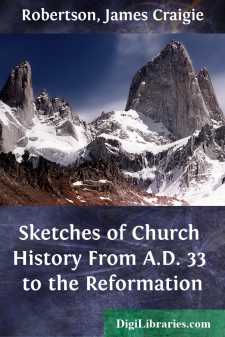Categories
- Antiques & Collectibles 13
- Architecture 36
- Art 48
- Bibles 22
- Biography & Autobiography 813
- Body, Mind & Spirit 142
- Business & Economics 28
- Children's Books 15
- Children's Fiction 12
- Computers 4
- Cooking 94
- Crafts & Hobbies 4
- Drama 346
- Education 46
- Family & Relationships 57
- Fiction 11828
- Games 19
- Gardening 17
- Health & Fitness 34
- History 1377
- House & Home 1
- Humor 147
- Juvenile Fiction 1873
- Juvenile Nonfiction 202
- Language Arts & Disciplines 88
- Law 16
- Literary Collections 686
- Literary Criticism 179
- Mathematics 13
- Medical 41
- Music 40
- Nature 179
- Non-Classifiable 1768
- Performing Arts 7
- Periodicals 1453
- Philosophy 64
- Photography 2
- Poetry 896
- Political Science 203
- Psychology 42
- Reference 154
- Religion 513
- Science 126
- Self-Help 84
- Social Science 81
- Sports & Recreation 34
- Study Aids 3
- Technology & Engineering 59
- Transportation 23
- Travel 463
- True Crime 29
Sketches of Church History From A.D. 33 to the Reformation
Description:
Excerpt
CHAPTER I.
THE AGE OF THE APOSTLES.
33 100.
The beginning of the Christian Church is reckoned from the great day on which the Holy Ghost came down, according as our Lord had promised to His Apostles. At that time, "Jews, devout men, out of every nation under heaven," were gathered together at Jerusalem, to keep the Feast of Pentecost (or Feast of Weeks), which was one of the three holy seasons at which God required His people to appear before Him in the place which He had chosen (Deuteronomy xvi. 16). Many of these devout men were converted, by what they then saw and heard, to believe the Gospel; and, when they returned to their own countries, they carried back with them the news of the wonderful things which had taken place at Jerusalem. After this, the Apostles went forth "into all the world," as their Master had ordered them, to "preach the Gospel to every creature" (St. Mark xvi. 15). The Book of Acts tells us something of what they did, and we may learn something more about it from the Epistles. And, although this be but a small part of the whole, it will give us a notion of the rest, if we consider that, while St. Paul was preaching in Asia Minor, in Greece, and at Rome, the other Apostles were busily doing the same work in other countries.
We must remember, too, the constant coming and going which in those days took place throughout the world; how Jews from all quarters went up to keep the passover and other feasts at Jerusalem; how the great Roman empire stretched from our own island of Britain as far as Persia and Ethiopia, and people from all parts of it were continually going to Rome and returning. We must consider how merchants travelled from country to country on account of their trade; how soldiers were sent into all quarters of the empire, and were moved about from one country to another. And from these things we may get some understanding of the way in which the knowledge of the Gospel would be spread, when once it had taken root in the great cities of Jerusalem and Rome. Thus it came to pass, that, by the end of the first hundred years after our Saviour's birth, something was known of the Christian faith throughout all the Roman empire, and even in countries beyond it; and if in many cases, only a very little was known, still even that was a gain, and served as a preparation for more.
The last chapter of the Acts leaves St. Paul at Rome, waiting for his trial on account of the things which the Jews had laid to his charge. We find from the Epistles that he afterwards got his liberty, and returned into the East. There is reason to suppose that he also visited Spain, as he had spoken of doing in his Epistle to the Romans (ch. xv. 28); and it has been thought by some that he even preached in Britain; but this does not seem likely. He was at last imprisoned again at Rome, where the wicked Emperor Nero persecuted the Christians very cruelly; and it is believed that both St. Peter and St. Paul were put to death there in the year of our Lord 68. The bishops of Rome afterwards set up claims to great power and honour, because they said that St....


